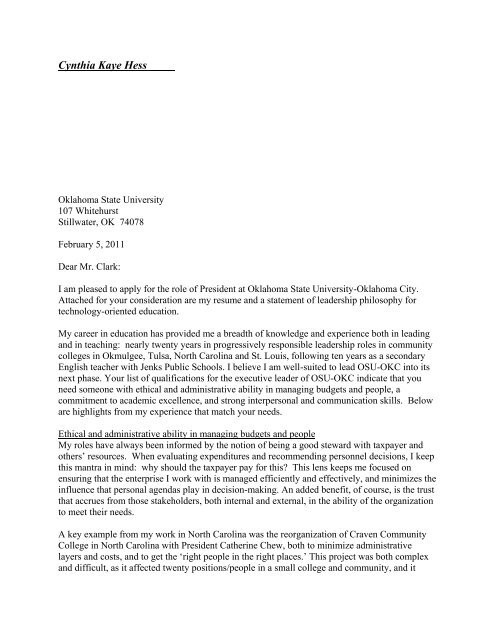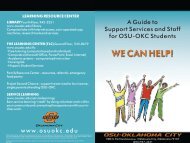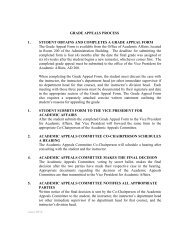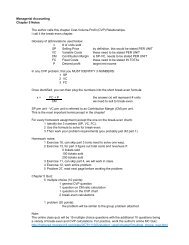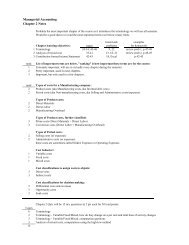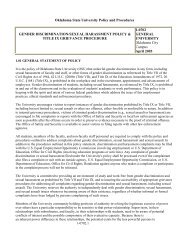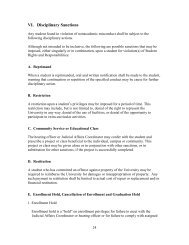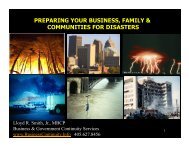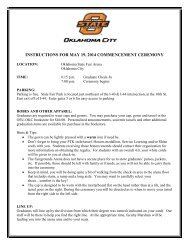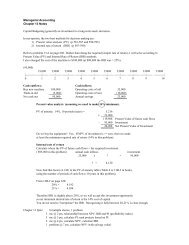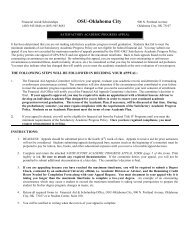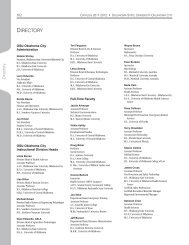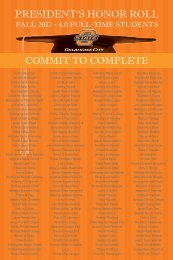cover letter - Oklahoma State University - Oklahoma City
cover letter - Oklahoma State University - Oklahoma City
cover letter - Oklahoma State University - Oklahoma City
Create successful ePaper yourself
Turn your PDF publications into a flip-book with our unique Google optimized e-Paper software.
Cynthia Kaye Hess<br />
<strong>Oklahoma</strong> <strong>State</strong> <strong>University</strong><br />
107 Whitehurst<br />
Stillwater, OK 74078<br />
February 5, 2011<br />
Dear Mr. Clark:<br />
I am pleased to apply for the role of President at <strong>Oklahoma</strong> <strong>State</strong> <strong>University</strong>-<strong>Oklahoma</strong> <strong>City</strong>.<br />
Attached for your consideration are my resume and a statement of leadership philosophy for<br />
technology-oriented education.<br />
My career in education has provided me a breadth of knowledge and experience both in leading<br />
and in teaching: nearly twenty years in progressively responsible leadership roles in community<br />
colleges in Okmulgee, Tulsa, North Carolina and St. Louis, following ten years as a secondary<br />
English teacher with Jenks Public Schools. I believe I am well-suited to lead OSU-OKC into its<br />
next phase. Your list of qualifications for the executive leader of OSU-OKC indicate that you<br />
need someone with ethical and administrative ability in managing budgets and people, a<br />
commitment to academic excellence, and strong interpersonal and communication skills. Below<br />
are highlights from my experience that match your needs.<br />
Ethical and administrative ability in managing budgets and people<br />
My roles have always been informed by the notion of being a good steward with taxpayer and<br />
others‟ resources. When evaluating expenditures and recommending personnel decisions, I keep<br />
this mantra in mind: why should the taxpayer pay for this This lens keeps me focused on<br />
ensuring that the enterprise I work with is managed efficiently and effectively, and minimizes the<br />
influence that personal agendas play in decision-making. An added benefit, of course, is the trust<br />
that accrues from those stakeholders, both internal and external, in the ability of the organization<br />
to meet their needs.<br />
A key example from my work in North Carolina was the reorganization of Craven Community<br />
College in North Carolina with President Catherine Chew, both to minimize administrative<br />
layers and costs, and to get the „right people in the right places.‟ This project was both complex<br />
and difficult, as it affected twenty positions/people in a small college and community, and it
2<br />
required an ability to stay focused on the overall goal: achieving greater effectiveness and<br />
efficiency in our structure, and hiring right, so that our students, staff and faculty were positioned<br />
for success. Key to the success of this task were the several „listening‟ sessions we held, both to<br />
develop guiding principles of the reorganization and to assist in refinements to the plan.<br />
I have focused my actions in all my formal leadership roles on providing our students the best<br />
learning environment possible, while ensuring that as public institutions, we are effective and<br />
efficient stewards of the public trust. That means effective and efficient use of financial and<br />
human resources. Throughout my tenure, I have continually assessed individual and program<br />
effectiveness and efficiency through transparent processes, and redeployed financial and human<br />
resources to match institutional priorities and goals. This cannot be accomplished well without<br />
strong interpersonal skills, and a recognition that programs and people must deliver on<br />
performance.<br />
Interpersonal and communication skills<br />
Effectively performing in the role of President requires a skillset that all leadership roles require:<br />
strong interpersonal skills, including effective speaking and listening, knowing the various<br />
audiences within and outside the college, including their diverse motivations and goals, finding<br />
common ground, and negotiating solutions for issues. I have been ranked consistently above<br />
expectations in my interpersonal and leadership skills by all my supervisors in my career.<br />
An example of my interpersonal skills was my work in North Carolina with faculty and staff to<br />
collaboratively create a means through which their performance could be assessed, which can<br />
often be quite contentious. Within the first five months of my employment there, through three<br />
large task forces, and much listening and learning, we created an effective appraisal system for<br />
faculty, staff, and administrators that became ingrained in the campus culture. In addition, we<br />
revised the means through which faculty „excellence‟ monies are distributed to match college<br />
priorities, and to increase the quality of our distance learning courses, we provided stipends for<br />
experienced faculty to mentor their faculty colleagues who were relatively new to the online<br />
environment as well as for faculty new to the community college environment. We developed<br />
and deployed a “one stop” approach to the delivery of student services, and re-invigorated our<br />
program review processes to ensure that our program offerings matched current workforce<br />
needs.<br />
These examples of implementing college priorities and effectively utilizing financial and human<br />
resources could not have been successfully executed without a belief in and respect for other<br />
people‟s talents and perspectives, and without a collegial, consultative, open style on my part,<br />
focused not on personal agendas, but on identifying common goals which ultimately improve the<br />
student learning experience.<br />
Another area where interpersonal skills are key are in work with area employers, who are major<br />
stakeholders in post-secondary education. In all my roles, I have fostered strong relationships<br />
with existing and potential partners. Active involvement in the community, and consistent<br />
communication with faculty and students about business and industry needs are critical in<br />
adjusting, re-inventing, and adding to the curriculum offerings of a college.
3<br />
My experience in North Carolina exemplifies a strong connection with business and industry.<br />
During my tenure there, we established an advanced manufacturing center with direct ties to<br />
Bosch-Siemens, who worked with us in establishing a new curriculum to serve their needs, both<br />
in advanced manufacturing and in Six Sigma. In addition, we developed and delivered a<br />
curriculum in composites manufacturing and repair in concert with Cherry Point, the Marine<br />
Corps air station in our service area. Key to both those efforts was initiating and maintaining<br />
strong professional relationships with key persons in both these industries, and effectively<br />
delivering training that matched their workforce needs. This meant constant professional<br />
development of our faculty, and continual assessment of our graduates‟ abilities and success in<br />
the workforce from the employers‟ perspective. My most recent experience is with St. Louis<br />
with Barnes-Jewish Hospital, where we are re-establishing a relationship with their Chief<br />
Learning Officer, and delivering both a respiratory therapy and nursing degree for cohorts of<br />
their employees.<br />
The President as well as key staff must be active, trusted members of community and regional<br />
organizations and boards to ensure that the college is known as a „trainer of choice‟ for its<br />
stakeholders. Relationships with K-12 and other educational entities, including business and<br />
industry, also pay off in the pursuit of grant and other funding opportunities, for which<br />
partnership and collaboration is essential.<br />
Academic excellence<br />
Community colleges are known for their diverse curriculum, including vocational/technical<br />
preparation, developmental education, customized training options, and college transfer<br />
coursework. Having worked in four community colleges in three states, and having taught<br />
doctoral courses on “The Community and Junior College” and “Effective College Teaching,” I<br />
possess both an intellectual and practical understanding and appreciation of the range of<br />
educational offerings we provide the community, and the range and diversity of the students we<br />
serve. Our faculty are challenged with maintaining currency not only in content, but also in<br />
instructional design and teaching methodology. Ongoing, strategic professional development for<br />
college faculty and staff is key to developing a college‟s capacity in any area, especially in the<br />
development of employees‟ ability to learn, think and act in a way that values and respects the<br />
diversity of our students in all parts of their learning experience.<br />
I strongly believe that learning should occur on both sides of the proverbial podium, which is<br />
why I‟ve been a strong supporter of faculty and staff development, and have always advocated<br />
for and provided employees access to and support for quality learning experiences. People who<br />
teach must learn. In addition to developing an appreciation for diversity, it is also critical that<br />
our faculty and staff continue to learn about the scholarship on learning and assessment, and<br />
most importantly, develop a capacity and habit of thinking critically about their daily work,<br />
whatever their role. There is much to learn about learning, and the college‟s leadership, including<br />
thought leaders from faculty and staff and those in formal leadership roles, must insist on<br />
practicing what we preach: the value of life-long learning. A commitment to academic<br />
excellence is simply not possible without expecting our faculty and staff to engage in learning<br />
themselves. In North Carolina, we created a Center for Teaching and Learning for that very<br />
purpose, and to focus on staff and professional development, and at Forest Park, we have a fully<br />
operational Center to support the notion that it‟s not just students we must teach.
4<br />
In closing, I am committed to continuing to provide leadership, service and support for faculty<br />
and students in my career, and being closer to our family in <strong>Oklahoma</strong> is a priority for my<br />
husband and me. In short, we‟d like to come home. I have the personal characteristics, work<br />
experience and ethic, as well as leadership qualities to effectively serve in the role of President at<br />
OSU-OKC, and look forward to an opportunity to discuss how I may meet the expectations and<br />
hopes you have for the next President in serving its students, faculty, staff and community.<br />
Sincerely,<br />
Cindy Hess<br />
Dr. Cynthia K. Hess


